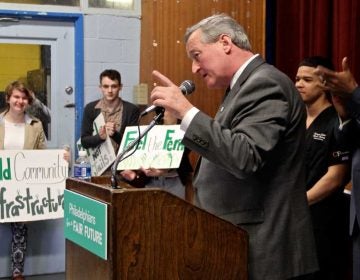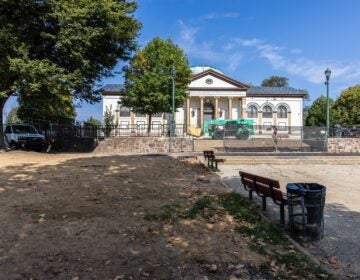City Council and Mayor Kenney play nice as rec center ‘rebuild’ advances
Mayor Kenney’s plan to revamp public facilities throughout Philly took another step forward this week, with key legislation passing out of a City Council committee on Monday.

Emily Coleman leads a ceramics class at Olney Rec Center. (Emma Lee/WHYY)
This story originally appeared on PlanPhilly.
—
Mayor Jim Kenney’s plan to revamp public facilities throughout the city took another step forward this week, with key legislation passing favorably out of a City Council committee on Monday. The positive movement hasn’t, however, fully ended an ongoing war of words between Kenney and dissenting council members who remain critical of the agreements that the mayor has struck with labor unions to diversify their ranks.
As he did last week, Kenney announced the latest progress at a press conference held at one of the city’s public facilities in dire need — Olney Rec Center. The hulking North Philadelphia community hub will begin to receive renovations with $8 million the city has on hand to spend on the $500 million Rebuild initiative.
“As you can see, this site is a perfect candidate for Rebuild. You all have dealt with a failing roof, flooding basements, a playground and fields that need work,” Kenney told an audience of more than 50 community members, many of them children eating pretzels and water ice as he spoke at the press conference, held on Tuesday. “I hope that you can rest a little easier knowing help is on the way and that soon you will start to see investments that you deserve.”
Assuming the project statement approved Monday gets passed by the full Council before its summer recess — Kenney indicated on Tuesday he has the votes to do so — it’ll open the door to a first cohort of more than 60 facilities receiving Rebuild funds over the course of the anticipated seven-year program. However, the soda-tax funded initiative is operating with only a fraction of the overall budget while the controversial levy remains in limbo with the courts — meaning that only a handful of those 60-plus sites can expect upgrades in the interim. The administration has said it won’t borrow $300 million in bonds unless the courts rule in their favor.
Olney will be second in line, after Vare Recreation Center in Point Breeze and Grays Ferry, to receive program funds, out of the 406 parks, playgrounds, recreation centers, and libraries eligible for upgrades across the city.
The mayor also took to the podium to reinforce his commitment to leveraging the public works initiative to create jobs for residents. Kenney reiterated his administration’s goal of 45 percent of the workforce on Rebuild sites consisting of minority and women workers. Philadelphia is a majority-minority city. In a departure from the tension of the last few weeks, his comments on the topic earned a positive response from at least one member of Council.
“That has never been institutionalized legislatively via a public works project in the city of Philadelphia,” Councilwoman Cherelle Parker said at Olney. “You [the mayor] are commended that this happened on your watch in a way that you can monitor it, we can quantify it, if there are any kinks in the program we can go back and say, hey, this is the goal but we’re not meeting it.”
While those ambitious diversity goals were codified in legislation passed in Council last June, a significant piece of how to achieve them — two Memorandum of Understanding (MOUs) involving the major building trades unions — has continued to be picked apart by members of council, who’ve suggested the MOUs aren’t sufficiently binding to guarantee the desired outcomes.
During an explanation of the MOUs to the audience at Olney, Kenney suggested the MOUs are close to concrete. “Those commitments have been memorialized in two written agreements signed by myself and the chair of the Philadelphia building trades council, John Dougherty,” Kenney said.
One of the MOUs establishes a new program in which Philadelphians with no experience in the construction industry will receive classroom and on-the-job training with the trades, all while being paid a wage comparable to union apprentices. The other MOU outlines a pathway for individuals with trades experience outside of the unions to receive a union card, following a year-and-a-half stint of working on Rebuild sites.
The latter MOU sparked a controversy in City Hall after it was presented to council on May 3. In private meetings and in the media, members voiced concerns about this latest agreement with the unions, which some perceived to be shoddily put together. Emotions have since boiled over. On May 11, Kenney sent a fiery letter to Council President Darrell Clarke threatening to scale back Rebuild due to what the mayor perceived to be unwarranted delays. Despite triggering heated pushback from Council, the letter seems to have had its intended effect, nudging legislation forward — clearing committee on Monday — that had been introduced in November.
Despite moving ahead with Rebuild, the mayor’s opposition within Council continues to be frustrated by the tenor of his letter, which largely blamed the delays of the project on Council’s unwillingness to act. They instead are asking Kenney to look in the mirror if he needs a culprit for the slow progress.
“This leg of the Rebuild legislative package is moving along in accordance with members’ expectations,” Jane Roh, communications director for Council President Clarke, wrote in a statement. “Of course, the Administration’s preference that Rebuild be financed with a soda tax — which was always going to invite litigation — is the reason Rebuild has yet to be realized.”
“We do not have the money to start Rebuild, even if we passed this weeks ago, the money’s not there,” Clarke said Monday at a convening of the Committee of the Whole.
According to Jim Engler, deputy mayor for policy and legislation, nothing has changed within either MOU since May 3. Asked why there’s apparently been a shift in the temperature of council since then, Engler said in a statement, “That’s a question for City Council. We have not received any feedback.”
Outside of Olney, Kenney told reporters that he wasn’t sure how much his letter impacted council, although sounded pleased with the progress nonetheless. “I think Council convinced themselves that it was important to get it done,” Kenney said. “They’re my friends. I mean, I want to work with them. I don’t want to be adversarial. I’m glad that everybody is on the same page again.”
Sources close to council disagree on the political fallout of Rebuild’s latest step forward. One council staffer suggested it’s a sign that Kenney’s gambit clearly worked. “It seems like a tactical defeat for the folks who were blocking the advancement of the bill. They asked for an additional thing within the MOU, didn’t get it, and still moved the legislation forward.”
But another source close to council contends that the narrative put forward by Kenney in his letter was overtly misleading. “We still don’t know what the rationale was for [the mayor] sending the letter and for him seeming not to understand why the money hasn’t been borrowed and spent … We’re moving according to a schedule that the administration set. It’s their timeline. As they’ve said, there’s no Plan B if we lose on the litigation. At the end of the day, the soda tax litigation is the thing that starts the clock.”
Hearings over the soda-tax litigation have been ongoing this month. There’s no sign of when the lawsuit will be ruled on by the state’s justices.
WHYY is your source for fact-based, in-depth journalism and information. As a nonprofit organization, we rely on financial support from readers like you. Please give today.









